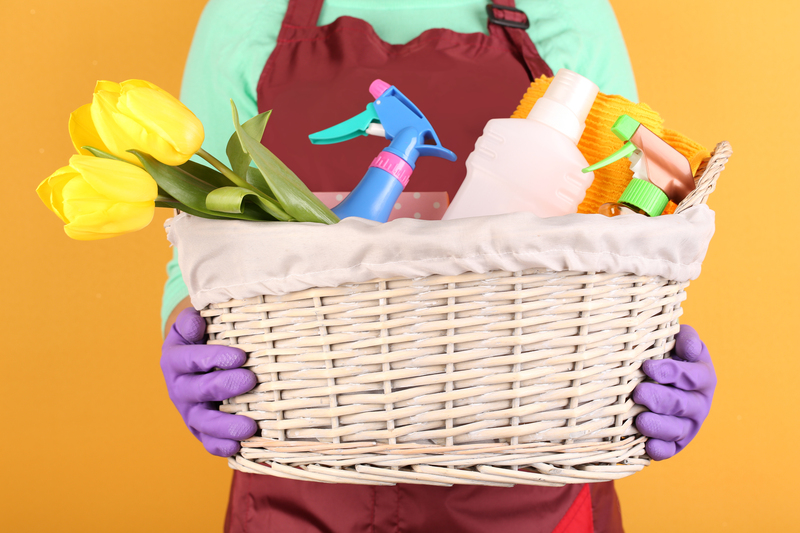Deep Dive into Extensive Jewellery Cleaning Techniques
Posted on 24/06/2025
Deep Dive into Extensive Jewellery Cleaning Techniques
Jewellery is more than just an accessory; it is a statement of style, heritage, and sentimentality. However, over time, even the finest jewels can lose their luster due to exposure to the environment, oils from the skin, lotions, or simply everyday wear and tear. This comprehensive guide delves into extensive jewellery cleaning techniques--from simple home remedies to professional methods--tailored for different types of jewels and precious metals. Whether you're looking to restore a family heirloom or keep your modern jewellery dazzling, you'll find the solutions here.

Why Jewellery Cleaning Is Essential
Jewellery, especially pieces worn regularly, accumulates grime and residues that can dull their appearance or even cause damage. Dirt build-up not only obscures shine but might also erode delicate settings.
- Preserves Aesthetic Beauty: Regular cleaning ensures brilliance and enhances the look of your jewellery.
- Protects Against Damage: Removes potentially abrasive particles and corrosive agents.
- Improves Longevity: Well-maintained jewellery tends to last across generations.
Understanding Jewellery Materials Before Cleaning
Before diving into advanced jewellery cleaning techniques, it's crucial to understand the composition of your pieces. Different gemstones and metals require tailored care. Using the wrong cleaning method may result in irreversible damage. Here's what you need to consider:
- Gold: Known for its resistance to tarnish, but easily scratched.
- Silver: Prone to tarnishing and abrasion.
- Platinum: Durable but may accumulate surface scratches.
- Diamonds: Hardest gemstone, but grease and grime can dull their sparkle.
- Precious stones (emerald, ruby, sapphire): Vary in hardness and susceptibility to chemicals.
- Pearls and opals: Soft and porous; require the gentlest touch.
Tip: Always identify the materials in your jewellery before selecting a cleaning technique!
Professional vs. DIY Jewellery Cleaning Techniques
Should you clean your jewellery at home, or is it always better to seek professional help? Here is an in-depth look at both approaches:
Professional Extensive Jewellery Cleaning Services
- Ultrasonic Cleaning: Uses high-frequency sound waves to dislodge dirt from intricate settings. Ideal for hard stones and metals but can damage soft gems and glued items.
- Steam Cleaning: Utilizes high-pressure steam to remove grime and oils, primarily from durable jewellery types.
- Polishing: Specialized machines restore shine by removing superficial scratches, mostly for gold, platinum, and silver.
- Rhodium Plating: For white gold, a thin rhodium layer is reapplied to revive the white finish.
- Inspection and Repair: Professionals also check for loose stones, worn prongs, and hidden damage during cleaning.
DIY Home Jewellery Cleaning Methods
For everyday upkeep, you can adopt several at-home jewellery cleaning techniques. Here's a deep dive into popular and safe methods:
-
Soapy Water Bath:
Simply mix a few drops of mild dish soap with warm water. Soak your jewellery for 15-20 minutes, brush gently with a soft toothbrush, rinse, and pat dry. This method is safe for gold, platinum, diamond, sapphire, and ruby jewellery. -
Baking Soda Paste:
For tarnished silver, make a paste of baking soda and water. Gently rub onto the jewellery with a soft cloth, rinse, and dry. Avoid on pieces with delicate gemstones. -
Ammonia Solution:
Mix six parts water to one part ammonia. Briefly soak diamond jewellery (never pearls or soft gems) for a high-gloss finish. -
Alka-Seltzer Cleanse:
Drop your jewellery into a glass of fizzing Alka-Seltzer for a quick refresh, then rinse and dry. -
Toothpaste Touch-Up:
Non-gel, non-abrasive toothpaste can shine up metals, but use with caution--test a small area first and avoid soft stones. -
Polishing Cloths:
Specially treated cloths remove tarnish and add shine without the need for chemicals. -
Microfiber Wiping:
Regular dusting with a microfiber cloth can prevent oils and dirt from building up.
Step-by-Step: How To Clean Different Types of Jewellery
1. Cleaning Gold Jewellery
- Prepare a lukewarm soapy water bath (avoid hot water, which can cause cracks in gemstone settings).
- Soak the piece for 15 minutes.
- Use a soft brush to remove grime, especially around settings.
- Rinse in clean water and pat dry gently with a lint-free cloth.
For stubborn grime, repeat the process or add a drop of ammonia to the soapy solution. Never use harsh abrasives!
2. Cleaning Silver Jewellery
- Line a bowl with aluminum foil, fill with hot water and add baking soda and salt (1 tablespoon each per cup of water).
- Place the silver item touching the foil so a chemical reaction can lift tarnish.
- Let soak for up to 10 minutes; rinse thoroughly and dry with a soft cloth.
Commercial silver polishes also work well, but avoid them on pieces with porous stones or antique finishes.
3. Cleaning Diamond Jewellery
- Use a solution of warm water and mild dish soap.
- Soak for 20-30 minutes for maximum effect.
- Gently brush and rinse. Avoid touching diamonds directly to minimize fingerprint smudges.
4. Gentle Cleaning for Pearls and Delicate Gemstones
- Wipe pearls after every wear with a very soft, damp cloth.
- Never immerse pearls or opals in water as they are highly porous.
- For persistent dirt, use a mild soap solution applied with a clean makeup brush, then wipe dry promptly.
- Store pearls flat, in a soft pouch, away from direct sunlight and heat.
Special Considerations for Extensive Jewellery Cleaning
Ultrasonic Cleaners: When and When Not to Use
Ultrasonic cleaners provide an exceptional deep clean for certain jewellery types but are not suitable for all pieces. Avoid using them for:
- Pearls, opals, turquoise, and other porous stones.
- Antique or fragile items prone to chipping or loosening.
- Jewellery with glued-in stones (the vibration may weaken the adhesive).
How Often Should You Clean Your Jewellery?
For pieces worn daily--like engagement rings or favorite necklaces--weekly cleaning is advisable. Other items can be cleaned monthly. Professional cleaning and inspections should occur once or twice a year for fine jewellery.
Storage and Prevention: Keeping Jewellery Clean Longer
Prevention is as important as cleaning. Here's how to store and care for your jewellery to minimize frequent cleaning:
- Individual Storage: Keep pieces in separate pouches or compartments to prevent scratches.
- Low Humidity: Store silver with anti-tarnish strips in a dry place.
- Avoid Chemicals: Remove jewellery before swimming, bathing, or applying lotions and perfumes.
- Regular Check-Ups: Inspect clasps and settings to catch wear-and-tear early.
- Travel Protection: Use hard-case travel boxes lined with soft fabric to avoid jostling and impact damage.
Extensive Jewellery Cleaning Techniques: Mistakes To Avoid
- Never use bleach or chlorine; these corrode precious metals.
- Do not use abrasive cleaners (like baking soda or toothpaste) on soft stones or plated jewellery.
- Avoid soaking porous gems and all costume jewellery pieces.
- Refrain from ultrasonic cleaning for vintage or fragile items.
- Dry jewellery thoroughly before storing to prevent tarnish or mold formation.
Environmentally Friendly Jewellery Cleaning Solutions
Eco-conscious methods are growing in popularity. Consider these green options for effective and safe cleaning:
- Use white vinegar and baking soda for silver jewellery.
- Try lemon juice diluted with water to brighten gold (avoid on gemstones).
- Polish with recycled microfiber cloths rather than disposable wipes.
- Buy biodegradable, plant-based cleaners designed for jewellery.

FAQs: Your Jewellery Cleaning Questions Answered
- Can vinegar clean gold jewellery?
Vinegar is not recommended for gold jewellery with gemstones. For plain gold, brief exposure is safe but rinse thoroughly. - How do I clean costume jewellery?
Use only a soft, dry cloth. Avoid water, as adhesives and plating can be damaged. - Does toothpaste damage silver?
Regular toothpaste can be too abrasive, especially for antique or silver-plated pieces. Use a dedicated silver cleaner instead. - Are ultrasonic cleaners safe for every gem?
No. Avoid for soft and porous stones, as well as fracture-filled or heat-treated gems. - Should pearls be polished?
No. Pearls should only be wiped gently with a soft cloth; avoid polishes and chemicals.
Conclusion: Make Your Jewellery Shine with Smart Cleaning Techniques
In conclusion, maintaining the allure and value of your jewellery collection requires careful, regular cleaning, and proper upkeep. By adopting the extensive jewellery cleaning techniques outlined in this guide--from professional methods to eco-friendly DIY remedies--you will ensure every piece sparkles and lasts. Remember to clean thoughtfully, store wisely, and consult experts for treasured heirlooms or delicate gems. With routine care, your jewellery will continue to captivate for generations.
```



